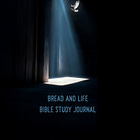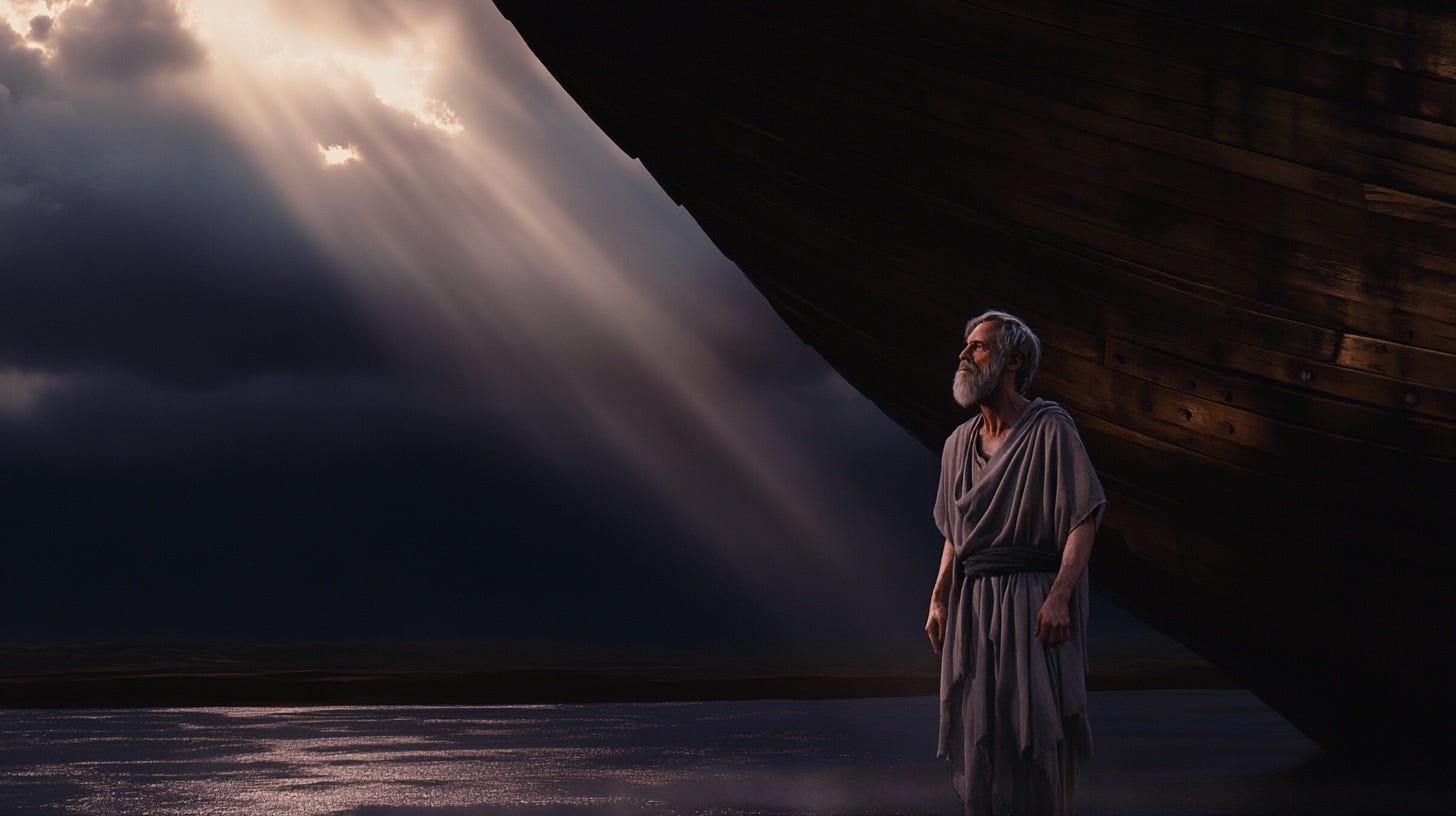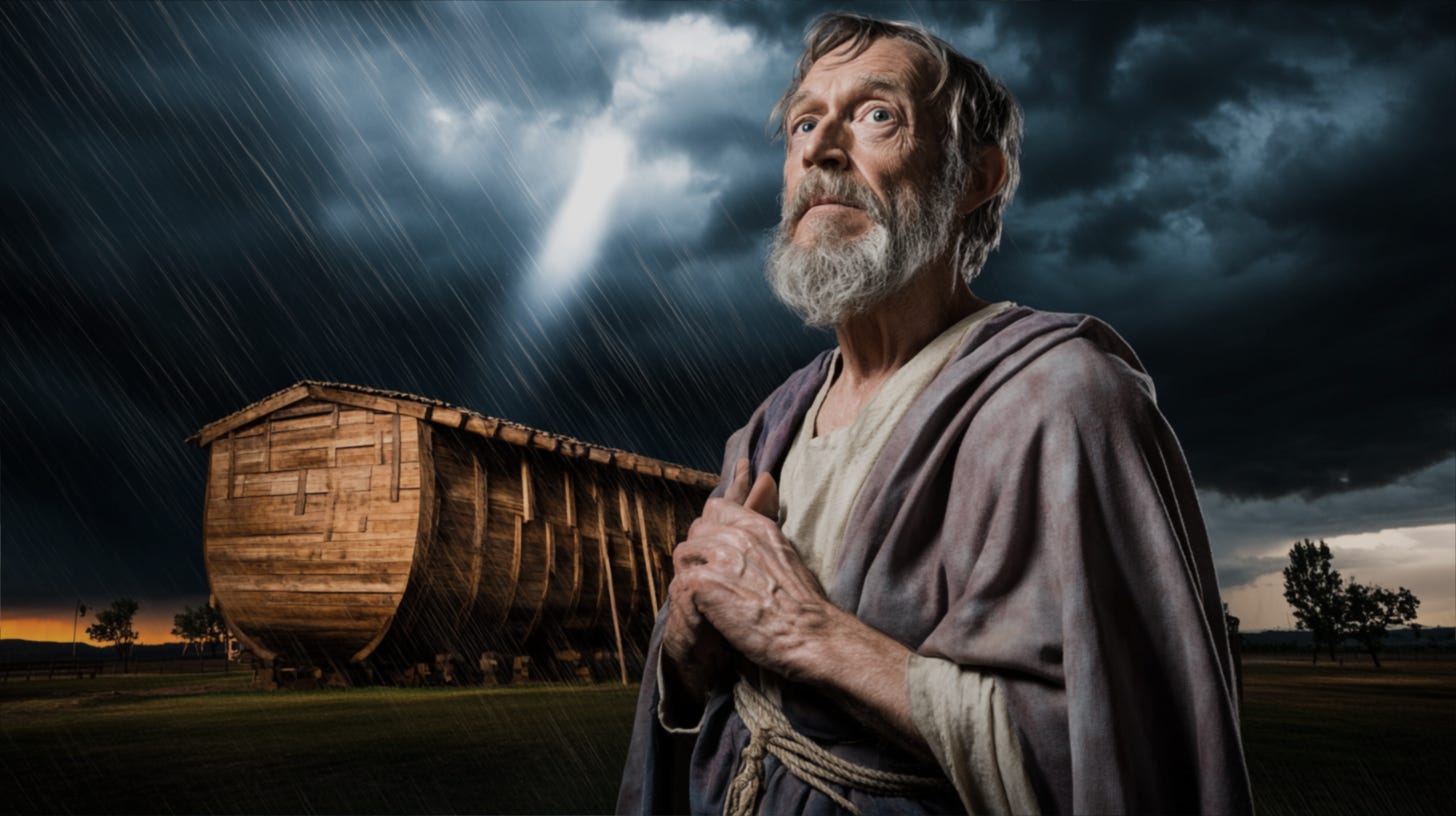Week 5: Noah and the Preservation of the Righteous Line
God’s Faithfulness Amid Judgment
Week 5: Noah and the Preservation of the Righteous Line
Theme: God’s judgment through the flood and His faithfulness in preserving Noah and His redemptive plan.
Objectives:
By the end of this lesson, participants will:
Understand why Noah was chosen to preserve humanity.
Recognize the ark as a profound symbol of salvation and God’s provision.
Reflect on God’s faithfulness to His covenant and His justice in judgment.
Scripture Focus:
Introduction:
The story of Noah is not just about a flood; it is a testimony to God’s holiness, mercy, and unwavering commitment to His plan of redemption. In a world rampant with corruption and violence, Noah’s righteousness stands as a beacon of hope. His life reveals what it means to walk in obedience to God amid opposition and chaos. The ark, built by Noah’s faith and God’s direction, becomes a tangible representation of salvation, prefiguring the ultimate deliverance found in Christ. This lesson invites us to explore how God’s justice and mercy intertwine, urging us to trust His plans even when they seem beyond comprehension.
Noah: A Righteous Man in a Wicked World
"Noah was a righteous man, blameless among the people of his time, and he walked faithfully with God."
Noah’s righteousness was not about perfection but about his unwavering trust and faithfulness toward God. In a culture deeply corrupted by sin, Noah’s life was marked by moral and spiritual integrity. His walk with God exemplifies a life rooted in intimacy and trust. This reminds us that our righteousness does not come through self-effort but through a genuine relationship with God. Noah’s faith set him apart, and his example calls us to stand firm in our identity as children of God, even when the world around us has turned away from Him.
Noah’s story also challenges the notion that righteousness is subjective or defined by societal standards. His blamelessness demonstrates a transcendent standard rooted in God’s unchanging character. In a culture that often justifies sin or dismisses moral accountability, Noah’s life is a powerful example of what it means to walk a countercultural path. His faithfulness to God’s ways reminds us that true righteousness aligns with divine truth, not shifting human norms.
The preservation of Noah and his family illustrates humanity’s pivotal role in God’s redemptive plan. Through the faithfulness of one man, God set the stage for the renewal of the earth and the continuation of His purposes. This demonstrates the profound impact that obedience to God’s call can have, not just for individuals but for generations to come. Noah’s story invites us to see our own lives as significant within the broader narrative of God’s restoration of the world.
Finally, Noah’s life reveals the cosmic dimensions of the battle between God’s kingdom and the forces of sin and corruption. His obedience is not merely a personal matter but part of a larger spiritual narrative in which God’s justice and mercy are displayed. This perspective encourages us to view our faithfulness to God as participation in His overarching plan to restore creation and vanquish evil.
The Ark: A Symbol of Salvation
"So make yourself an ark of cypress wood; make rooms in it and coat it with pitch inside and out."
The ark is far more than a vessel; it is a profound symbol of God’s provision for salvation. Its detailed construction reflects the care and intentionality of God’s redemptive work. It foreshadows Jesus, who is our ultimate refuge and salvation. Just as Noah and his family entered the ark to escape judgment, we are invited to abide in Christ, who shields us from the consequences of sin and restores us to fellowship with God. The ark’s role in preserving life points to the way Christ preserves us, offering safety and hope in a world marked by brokenness.
The precise instructions for building the ark also highlight God’s sovereignty and foreknowledge. This challenges those who dismiss the flood narrative as mere allegory, underscoring the reliability of Scripture and God’s active involvement in history. The ark stands as a testament to God’s ability to accomplish His purposes and His invitation for humanity to trust in His plans, even when they seem incomprehensible.
The ark’s preservation of both human and animal life signifies God’s commitment to redeem not only humanity but all of creation. It reflects His plan to one day fully restore the earth to its original design. This moment in history points us forward to the ultimate renewal that will take place when Christ establishes His kingdom and makes all things new. The ark reminds us that our obedience and faith are part of a larger cosmic redemption.
Finally, the ark’s construction and survival emphasize God’s power over creation and His ability to provide a way of salvation amid chaos. It reminds us that the physical realities of the world are deeply intertwined with spiritual truths. The ark invites us to see God’s provision not just as practical but as deeply spiritual, drawing us into His greater redemptive narrative.
God’s Covenant with Noah
"But I will establish my covenant with you, and you will enter the ark—you and your sons and your wife and your sons’ wives with you."
God’s covenant with Noah is a profound testament to His faithfulness and His commitment to preserving life. This covenant was not based on Noah’s merits but was an extension of God’s grace, showing that His mercy extends beyond judgment. The establishment of this covenant ensured that humanity would continue, even after the devastation of the flood. It serves as a foreshadowing of the greater covenant fulfilled in Christ, where salvation is extended to all who believe in Him.
This covenant also underscores God’s unchanging nature and His trustworthiness. Throughout history, God has made and upheld covenants with His people, demonstrating that He is a God who keeps His promises. Just as Noah found security in God’s covenant, we too can find assurance in the promises God has made to us, knowing that His plans for redemption remain steadfast.
Beyond ensuring the survival of Noah and his family, this covenant establishes a foundation for God’s ongoing relationship with humanity. It is a declaration of divine grace and protection, revealing God’s desire for restored fellowship with His creation. As we reflect on this covenant, we are reminded of God’s enduring love and His invitation to trust in His faithfulness, even when circumstances seem uncertain.
Reflection and Response:
Reflect on areas of your life where God is calling you to trust Him more deeply. How can you walk in obedience, even when the path seems unclear?
Write a prayer of gratitude for God’s faithfulness in your life, thanking Him for His provision and grace.
Meditate on the ark as a symbol of salvation. How does this shape your understanding of Christ’s role in your life?
Additional Resources:
Hebrews 11:7: Reflect on Noah’s faith as an example for believers.
1 Peter 3:18-22: Explore the connection between the flood and salvation through Christ.
Song: “Way Maker” by Leeland – A powerful declaration of God's provision, presence, and faithfulness, reflecting the themes of Noah's story.
Key Takeaways:
God’s justice and mercy are perfectly balanced in His dealings with Noah and the flood.
Noah’s faithfulness and obedience are powerful examples of trusting God amid uncertainty.
The ark is a profound symbol of salvation, pointing to Jesus as the ultimate Savior.
God’s covenant with Noah assures us of His faithfulness to His promises, inviting us into His redemptive plan.
Conclusion:
The story of Noah is a reminder that God’s purposes are always redemptive, even in judgment. It calls us to live lives of faith and obedience, trusting that God’s plans are good and His promises sure. Just as Noah’s family found refuge in the ark, we are invited to find eternal refuge in Christ, who secures us in His love and redeems us for His glory. Let this story inspire you to walk faithfully with God, trusting in His provision and grace.






